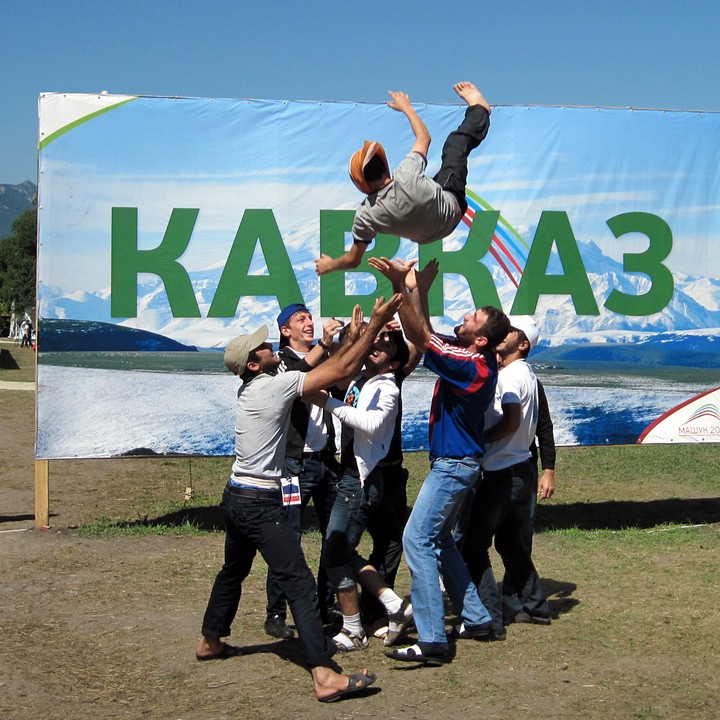North Caucasus Youth Forum Mashuk 2010, some random notes

The basic idea of the forum is rather interesting… all participants come from the Federal District of the Northern Caucasus (Stavropolskij Kraj, Karachaj-Cherkessia, Kabardino-Balkaria, North Ossetia, Ingushetia, Chechnya, Dagestan) plus, at least in the original project, Abkhazia and South Ossetia.
The programme includes training and classes dedicated to “intercultural interaction” that all participants must attend. Basically, participants from different parts of the Russian Caucasus are given a chance to know each other better, to discuss about the stereotypes they have about each other, and so forth.
Participants are strongly encouraged to develop an own “project” (in the social sphere, or simply a business project). There’s a team of experts that help participants in developing the project through different stages. The projects are then judged by this commission of experts, and the winners obtain a state grant to develop their projects (grants are supposed to be between 1250 and 5000 euro). The total amount of the grants is 10 million roubles (about 250,000 euro)… all in all, a rather modest sum… that Prime Minister Putin has declared will be increased to 100 million roubles for the next forum in 2011.
The “rules of the game” to obtain grants are clear, and comparing to Seliger (a larger youth forum dedicated to young people from all of Russia) it seems easier to get support here at Mashuk to improve one’s project. It seems to be that in relative terms, here there were more people than in Seliger with a real project they wished to implement (out of 650 participants, about 250 projects were presented, 30 won a grant).
Some random notes about the things I’ve noticed in these days… (a more reasoned article to come maybe next week)
-
all participants live in tents and eat together at an open air canteen;
-
positive and friendly atmosphere;
-
very strict security around the camp… you need to pass two check points to get to the camp;
-
the camp is organized in a place where a Soviet youth camp was based, and some of its half destroyed structures are still very well visible;
-
every day a different region/republic presented its culture and traditions;
-
no delegations from Abkhazia and South Ossetia are actually present (South Ossetia was here in the first shift, apparently only two guys came in the second, while a couple of participants from Abkhazia came in the first days of the camp, then they left, and nobody came…I’ll try to make a couple of phone calls to Sukhumi to figure out what really happened in the next few days, since everybody here gave only vague answers)
-
the actual number of participants is smaller than expected… during the second shift that was supposed to have 1000 participants, only 650 were constantly present (this figure excludes occasional guests);
-
evident government support… heads of all the regions involved came to visit the Forum (with the exception of Chechnya’s Kadyrov, apparently on holidays);
-
head of the federal agency for youth affairs Vasilij Jakemenko visited the camp on the opening day;
-
head of the federal department for youth affairs Boris Gusev visited the camp on the closing day;
-
large portraits of President Medvedev and Prime Minister Putin around the main stage of the camp;
-
head of the federal district of the Northern Caucasus Aleksandr Khloponin visited the camp on August 16;
-
Chechnya’s delegation celebrated the birthday of Akhmet Kadyrov, former president of Chechnya, and father of current president Ramzan Kadyrov… the sport competitions of the day were dedicated to Akhmet Kadyrov… portraits of both Kadyrov father and son are on display;
-
one afternoon, the presentation of a “patriotic club” run by Edinaja Rossija, has taken place;
-
participants from different delegations (including Ingushetia and Daghestan) find the food here so bad, that they buy foodstuff separately;
-
loads of organizational problems, especially during the first days of the camp (for example, sleeping bags were missing);
-
projects were presented, and experts were available to help participants developing their social or business project;
-
all projects were then judged by five different experts that judged different aspects of the project (considering probability of success, ability of presenting the project, the partners involved, etc.). the hearings were public, and every expert gave a note between 1 and 10 to every single aspect of the project. The whole process seemed to me rather open. In spite of this, some participants suggested that the selection process was at least partially piloted, and that some applicants were “more equal than others”;
-
management and instructors come largely from central Russia… partially as a consequence, participants from the Caucasus lamented lack of understanding of the local reality from the side of the organisation;
-
in spite of all the rhetoric of integration of participants from different regions, they actually live and work in groups made according to the region they come from, and do have a chance to actually meet each other mostly in the free time or during sport and leisure activities;
-
lots of changes planned for next year (including a a tenfold increase in the budget for grants and more mixing of participants from different regions during the forum).
You can see some pictures I took during the camp on my Flickr page.
You can find a list of other youth forums taking place in Southern Russia/Northern Caucasus in the summer of 2010 in a previous post.